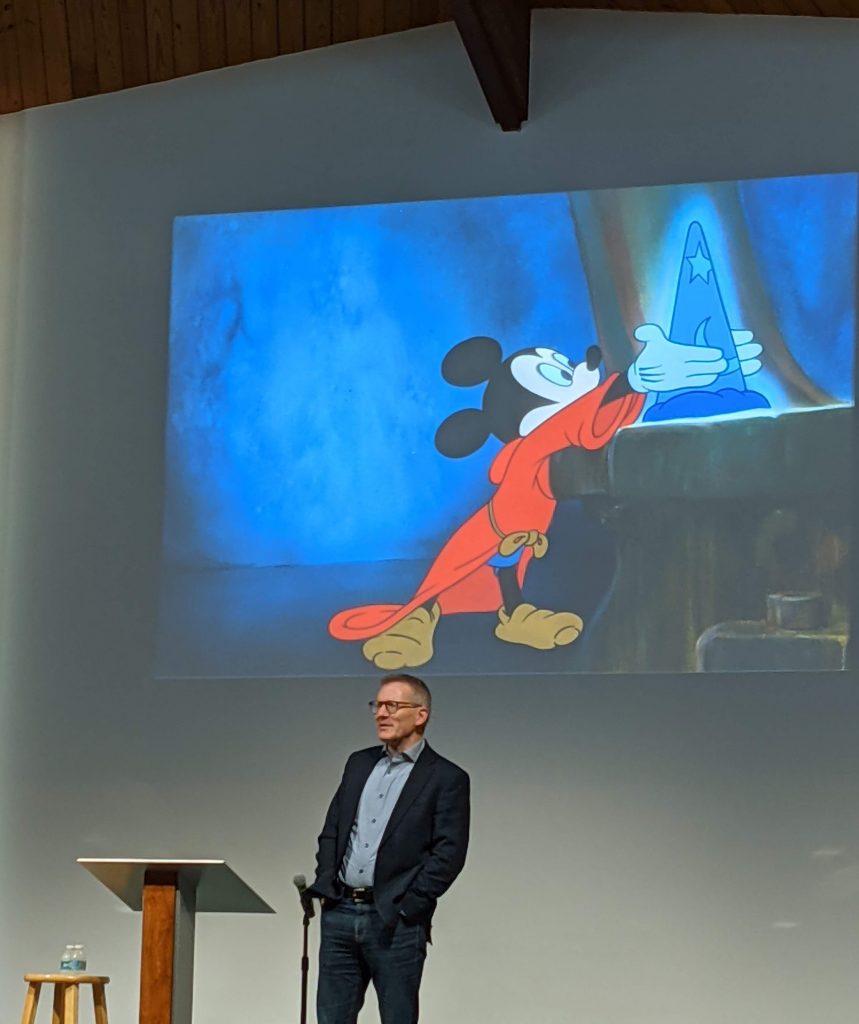
Andy Crouch came to speak in my town a week ago, on the subject of his most recent book, The Life We’re Looking For, which is a more general and philosophical book on the same topic of tech he previously addressed in The Tech-Wise Family. Here are some of my notes from the evening, plus a little commentary.
If tech makes something easy or gets labeled “superpowers,” Crouch says that’s magic. Magic is changing the world without having to change yourself.
He argues that we need to flee from the modern temptation to distract ourselves at the slightest hint of boredom. Crouch tells his children, don’t run from boredom: creativity is on the other side of boredom. As someone with a number of artistic hobbies myself, I really appreciated this point, and it aligns with what I mentioned in my first post about finding myself less engaged in creative endeavors the last few years as I got more into consuming blogs and podcasts. Honestly, this is a hard habit to walk back on, but creativity ought to make it worth it for me.
On the subject of unaligned AGI—for those of you not familiar with that phrase, just think “robots taking over the world”—Christians already have a word for this! If future humans summon spirits we can’t control, only one community will have the experience to know what to do—the Christians. Crouch argues that the fact that the West doesn’t believe in demons is actually Christianity’s credit, because Christians dispelled demons from the West.
I found the Q&A particularly helpful, because in Crouch’s writing (and talk) it feels like he’s painting a picture of what the good life can look like generally, but it feels like it really falls short on practicals. I was pleasantly surprised about the amount he had to say on practicals when asked about it.
For example, someone asked, how do we decide what tech is worth the tradeoffs? Crouch’s response was that we should ask the questions, What is lost? What is gained? Does it free us up to care for others, or free us from the obligation to care for others? He gave a really helpful couple of potential examples—though someone might disagree with his take, it helped me picture what he’s getting at. His first example was the dishwasher. He talked about how grateful many housewives are to be freed up from the toil of washing dishes, which gives them more time for other things. On the other hand, he puts the microwave on the other side of the line. The microwave saves a little time over cooking, but it feels like something human is lost to eat, for example, microwave dinners—there’s something human about actually preparing a meal.
He talked about the Biblical dichotomy of work and rest vs. the modern dichotomy of toil and leisure. Rest is glad contemplation of the fruit of your own work, but leisure requires others to work for you (e.g. entertainment). Work itself is oriented towards fruit, but toil might be oriented towards idolatrous ends. Crouch likes the word Mammon, for the demon behind the idolatrous pursuit of wealth (Matthew 6:24) and argues that this really defines our society. In toil, Mammon wants you to care about numbers, not fruit.
Someone asked, “What should we care about caring for the world, if God is going to destroy this world and replace it with a new one anyway?” I find it frustrating how often this question gets asked in the Christian world. Crouch gave a great answer: When Jesus came He cast out demons—why would we not follow His example?
Someone asked him directly and generally about how we apply all this. He said the answer is not political (national), but not individual either—it is communal: most of all we must work on building communities with the right priorities. We must together live an “unboreable life of care for others”. This “not political or individual, but communal” third way matches a conviction I’ve been growing about what it looks like to see change. Not national, because most of us can’t impact that and policy tends to be superficial; but not purely individual, because though we need to work on inner character first, that plays out in our relationships with others who are pursuing common goals.